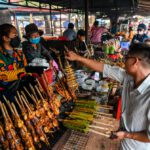Communication Within Cambodia
The advent of mobile phones has dramatically improved communications between the main towns. That said, many of the landlines destroyed during the Khmer Rouge era have yet to be replaced, and the lack of phone lines not only hinders ordinary business but also keeps Internet access costs high everywhere except Phnom Penh and Siem Reap. […]
The advent of mobile phones has dramatically improved communications between the main towns. That said, many of the landlines destroyed during the Khmer Rouge era have yet to be replaced, and the lack of phone lines not only hinders ordinary business but also keeps Internet access costs high everywhere except Phnom Penh and Siem Reap. It’s only been a few years since mail destined for Cambodia had to be collected in Bangkok, but the postal service is now reasonably reliable, although inbound letter that attract the attention of staff-there’s no rhyme or reason to this-often get pilfered.
All Cambodia’s mail is consolidated in Phnom Penh. Sending mail from provincial cities seems as reliable as posting from the capital, though it costs a little more as you’ll be charged for your mail to go to Phnom Penh first. Within the capital itself, only the main post office is geared up to accept mail bound for abroad.
Mail to Europe, Australasian and North America takes between five and ten days to arrive, leaving Phnom Penh for major international destinations around twice a week the specific days can be checked at the main post office. Stamps for postcards sent from the capital cost 1800 Riel to Europe and Australia, 2100 Riel to America (add 300 Riel if posting from the provinces).
Parcels can only be posted in Phnom Penh, though at a whopping $17 for a one kilogramme parcel going abroad, it’s worth deferring the task if you are subsequently heading to Thailand. You’ll be charge 3000 Riel for the the customs form, detailing the contents and their value, to be completed, but it isn’t necessary to leave the package open for checking. Post offices sell mailing boxes if you need them.
Phones
You can make domestic and international calls at post offices or telecom offices in most towns. The government telecommunications network; Camintel (W) (www.camintel.com) usually runs these services, which along with the Australian firm Telstra, also runs public call boxes in Phnom Penh. To use these, you’ll need a phone card, available in denominations ranging from $2 to $50; look for shops displaying the phone cards can’t be used in each other’s facilities, but with a Tele 2 phone card, you can make international calls from any call box by dialing the access code (T) 007 (instead of the usual (T) 001), then the country code and number as usual. With any of these options, making international calls is expensive at around $3 per minute, so It’s worth looking out for deals offered by internet shops, guesthouses and travel agents, which can as much as halve the cost.
For domestic calls only, the cut-price glass-sided booths, payable to the attendant. The booths vary in their coverage of Cambodia’s various networks: accessible numbers will be written on the side of the booths (usually (T) 012 MobiTel numbers – see below – plus the local area code and sometimes other mobile providers).
Faxing is extortionate in Cambodia, at $3-$6 per page. If you really must send a fax, the hotel business central and internet shops are the most reliable place to do so.
Mobile Phones
There are five mobile phone service providers in Cambodia: MobiTel (T) 012, Beeline (T) 090, Smart Mobile (T) 010 & 016, Cube (T) 013, MetFone (T)097. MobiTel is the most widely used network and has transmitters in all major towns, although reception is still limited to within the town boundaries.
Tourists can buy Sim Card for their mobile phones at arrival terminal of all airports in Cambodia and border Checkpoint. Usage is by pre-paid phone card, available in values from $2 to $100; in most towns, you’ll find outlets displaying the logos of the various providers. When you get your card, scratch off the panel on the back to reveal your PIN, then call up the top-up number-also given on the card-and enter the number to activate the card. Call rates are around $0.20 per minute within the same mobile network number or out to a local landline.
Internet access
If you want to get online, do it in Phnom Penh or Siem Reap – here you’re never far from an Internet shop or café and rates are under $1 per hour.
Currently free Wi-Fi is available at most hotels, restaurants, Mini Mart, Café and shopping mall.
In the provinces it’s a different matter: even in Battambang and Sihanoukville access is limited, and expensive at around $3 per hour. One of the best ways to keep in touch while traveling is to sign up for a free email address that can be accessed from anywhere, for example Yahoo Mail, Gmail, Outlook or Skype or Facebook. Once you’ve set up and send mail from any Internet Café, or from a hotel with Internet access.
There are Internet Service Providers in Cambodia such as Online, AngkorNet, Mekong Net, WirelessIp, Ezecom with reasonable price. Prepaid Internet Card is available at any shops and super markets and price is starting from $5 to $100.
The restaurants and café shop like the M Café, Café Sentiment, T & C Coffee, Global Coffee, True Cofee, Kiriya Coffee and more offer free internet access with WI-FI – there you just bring your own laptop only.




